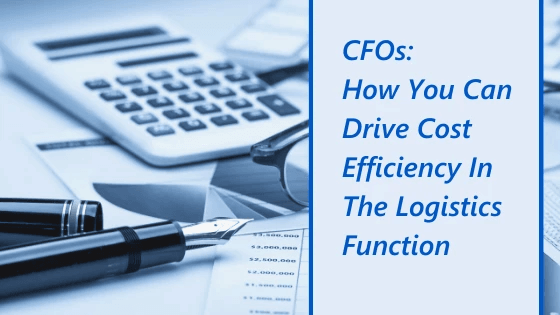

Every company can use logistics to help scale its business and develop a unique competitive advantage. The effect logistics has on reaching these goals is something a Chief Financial Officer (CFO) is especially able to see and value, despite their minimal daily interaction with the function, because of their position within a company. Even though CFOs are more removed, they can still directly impact the cost efficiency in the logistics function.
A great example is how huge industry players like Amazon have been successful because of the investments they’ve made into their logistics infrastructure. These investments have allowed them to create a competitive advantage over other retailers which now places them in the position to compete against prior logistics partners they once heavily depended on. With input coming from the right financial perspective, logistics investments can be a huge enabler for other shippers in much the same way.
Business functions of every type are seeing job roles change and evolve as technology becomes more integrated within organizations, and this is no different for their shipping operations. With the increasing demand for companies to provide more cost-efficient delivery at even faster speeds, it’s become more important than ever that the financial impact of logistics decisions done with consideration of the company-wide implications. The responsibilities of a CFO now extend past just corporate financial management.
Typically, CFOs help plan financial investments, oversee budgets and manage cash flow, among many other tasks. The role, however, now includes maintaining a company’s reputation and quality of service while also finding new ways to lower expenses.
For many companies, their biggest operating costs relate to transportation and supply chain operations. While CFOs will obviously gain visibility to these costs at some point, it may be too late if they act after the fact when costs have already exceeded budgets. In other words, shippers will only benefit when their CFOs are involved earlier when big-picture decision-making is done that impacts the logistics function.
At the same time, an uninformed perspective is not going to help, either. In order to add value for customers and keep a competitive edge,
Having the ability to strategize based on the data generated by the logistics function and understand the constraints placed on it are notable strengths to have as a CFO.
How the role of a CFO has evolved in relation to logistics operations reveals how the function itself has evolved into a more critical and complicated process. The ways companies can measure financial performance because of new advancements in technology have changed a lot in just a couple of years. Since CFOs can now make more informed financial decisions, the expectations surrounding their responsibilities are rising just as their skillset must expand.

From suppliers to the consumer, materials and information travel along the supply chain. The term logistics refers to the management of this process. Each of the decisions that are made along the way reaches each part of a business and its clients, which directly affects how a company performs financially.
A logistics function needs to offer a unique value to customers that establish how a company is different from its competition through efficient production or specialized services. If you’re a CFO looking for ways to create differentiation, consider how to leverage your logistics to demonstrate that level of value.
It’s important to make sure that your supply chain offers visibility for both your company and your customers. CFOs should also identify whether or not their logistics infrastructure and tools it has to operate are up to date with industry standards to ensure that it can meet the expectations in the marketplace.
Financial leaders need to be sure the company has the proper logistics technology to keep their processes operating at optimal efficiency. If you realize that your business is unable to respond promptly to potential supply chain disruptions, for example, that’s another issue that needs to be addressed. It’s also vital to make sure the right KPIs are in place that accurately measure performance and produce actionable results. Figuring out how your supply chain is operating now is the only way to ultimately allow your company to correct both the big and small things that are hurting efficiency.
There are a variety of methods a CFO can go about accomplishing this objective.
They can start by advocating for investments in innovative technology. Platforms like a Transportation Management System (TMS) are now a staple in the industry, not just because they automate basic manual tasks. It is also because a TMS helps distribute important information throughout the company. From optimizing transit times and carrier selection to managing freight costs to streamlining the delivery process, a TMS has a lot to offer and enables a quick ROI.
CFOs should also consider the potential to outsource logistics functions. Companies tend to fall back on working with certain carriers because it’s easier than making an effort to find better alternatives. Inertia with logistics buying is a real thing. When it comes to selecting carriers, a lot of discretionary buying takes place, but that’s often not the best way to ensure the right decision gets made.
Deliveries today come with higher expectations. Customers anticipate real-time updates, and suppliers who can provide this information through increased visibility and better tracking services will find themselves in the best competitive position.
Another way CFOs can help contribute to making improvements in a company’s logistics is by supporting strategic initiatives. For example, they can help implement practices within the supply chain, like performing a cost analysis for improving warehouse efficiency or analyzing carrier performance to decrease lead times.
CFOs can also reduce shipping costs to help establish a competitive advantage. Negotiating freight contracts is an element of logistics that can improve with input from a CFO — especially because freight costs typically make up about 3-5% or more of a company’s operating costs.
Larger environmental factors like fuel prices and industry regulations also impact rates. CFOs may have a better understanding of these current trends and industry issues in comparison to logistics managers who are stuck in the day-to-day. This knowledge could also help CFOs play a larger role in the negotiations between suppliers and carriers. Better insight can translate into lower rates and better terms, which allows companies to operate at a lower cost than their competition.
Improving operating efficiency and reducing costs can start with involving CFOs at more points in the logistics function. Focusing on details and measuring results can be enabled by better logistics technology and will allow CFOs to help set more meaningful goals for growth and what are ultimately more successful strategies.
As the role and responsibilities of the CFO change, they can now help optimize operations by supporting more data-driven decision making. Modern supply chain management requires improved communication and collaboration all around the C-Suite, and it can start with the CFO.
Want to learn more about Keller Logistics Group? View our Capabilities Video